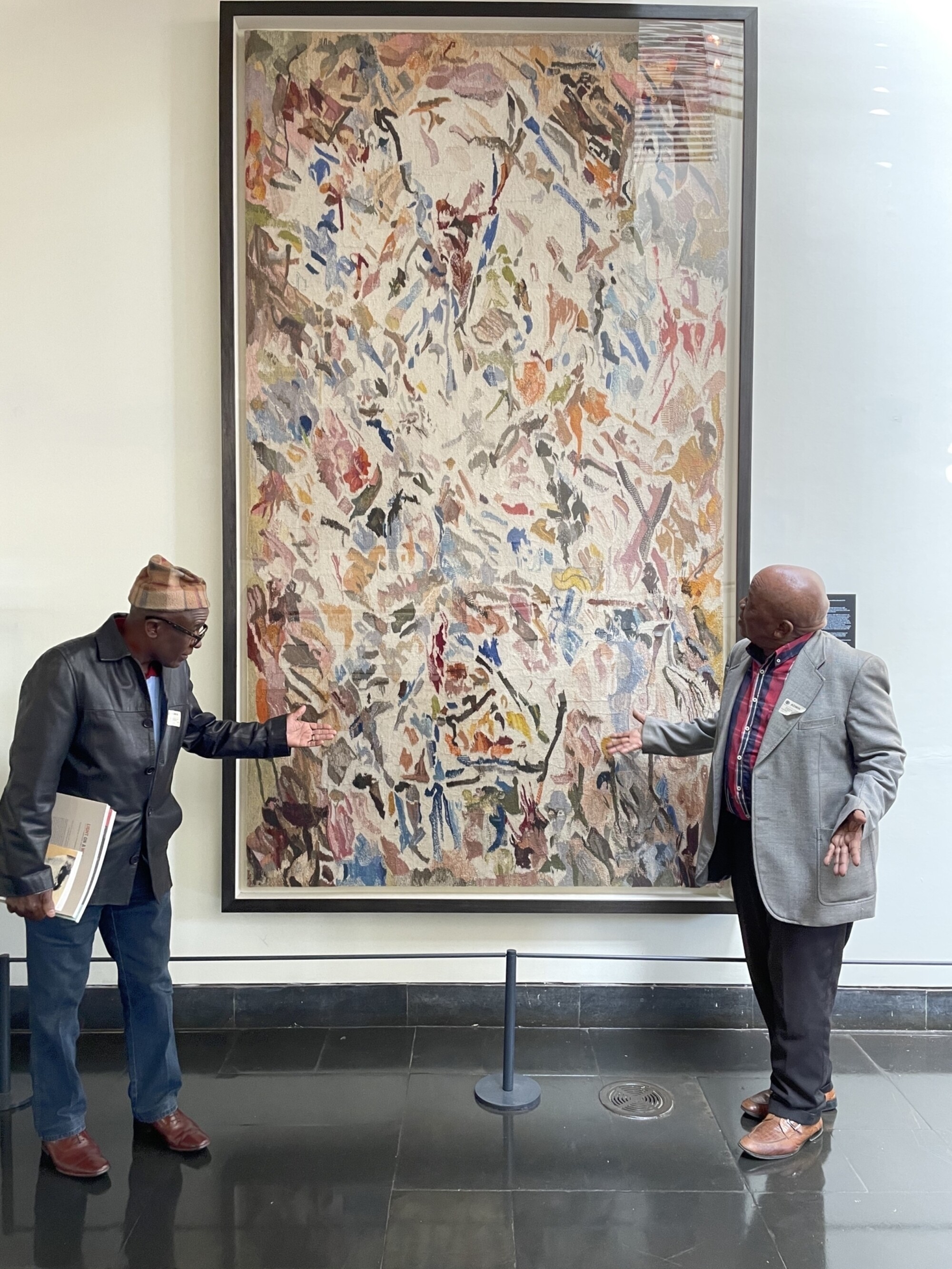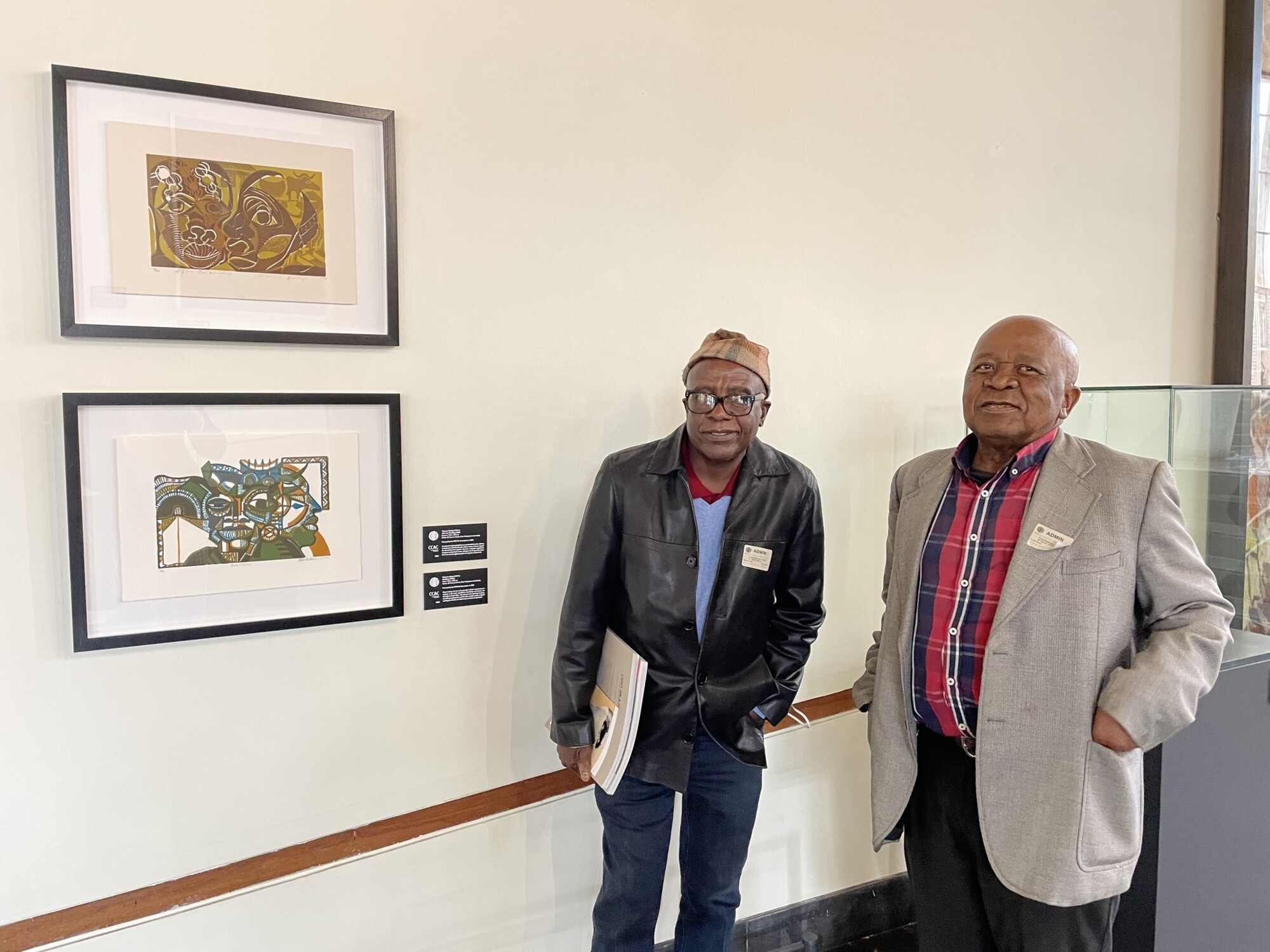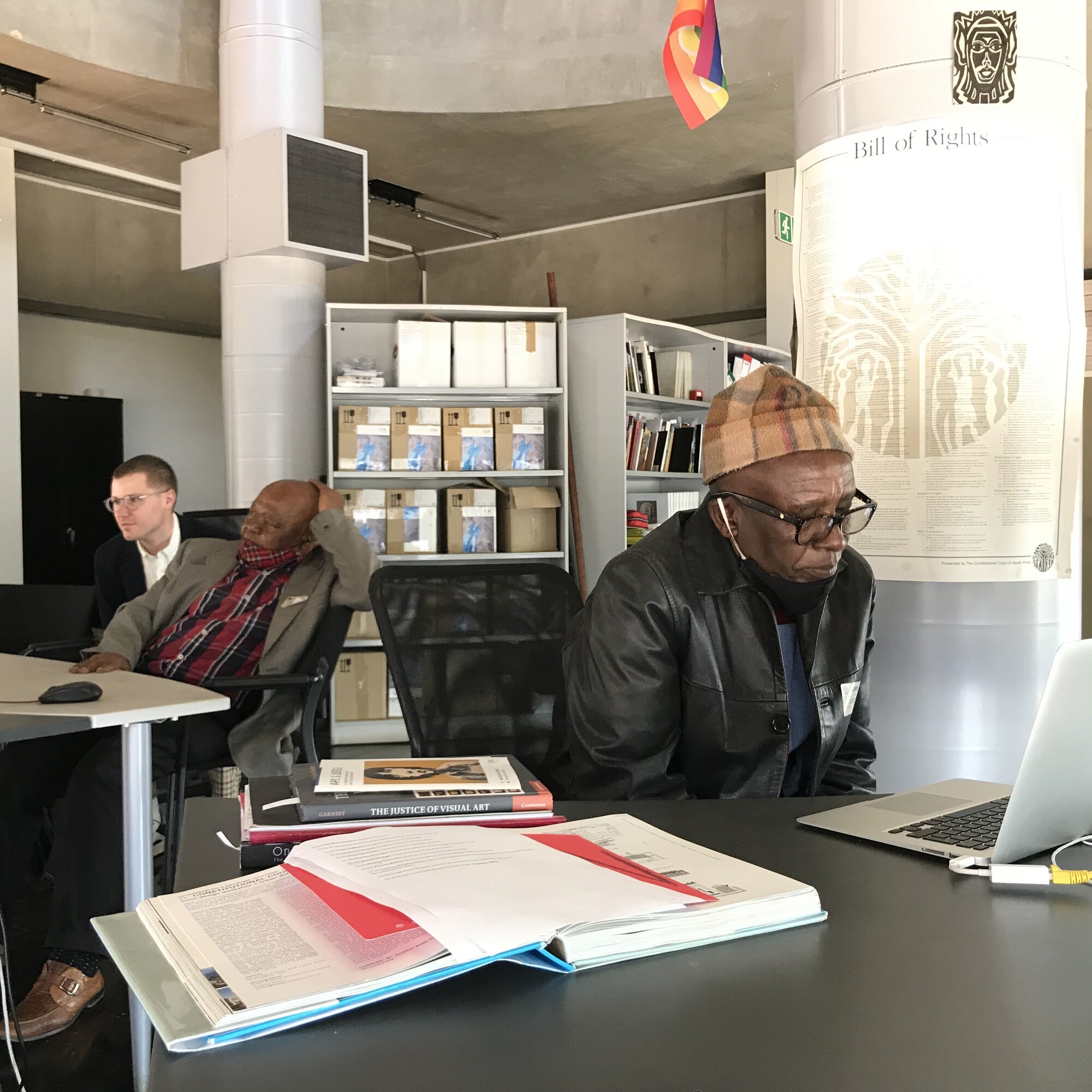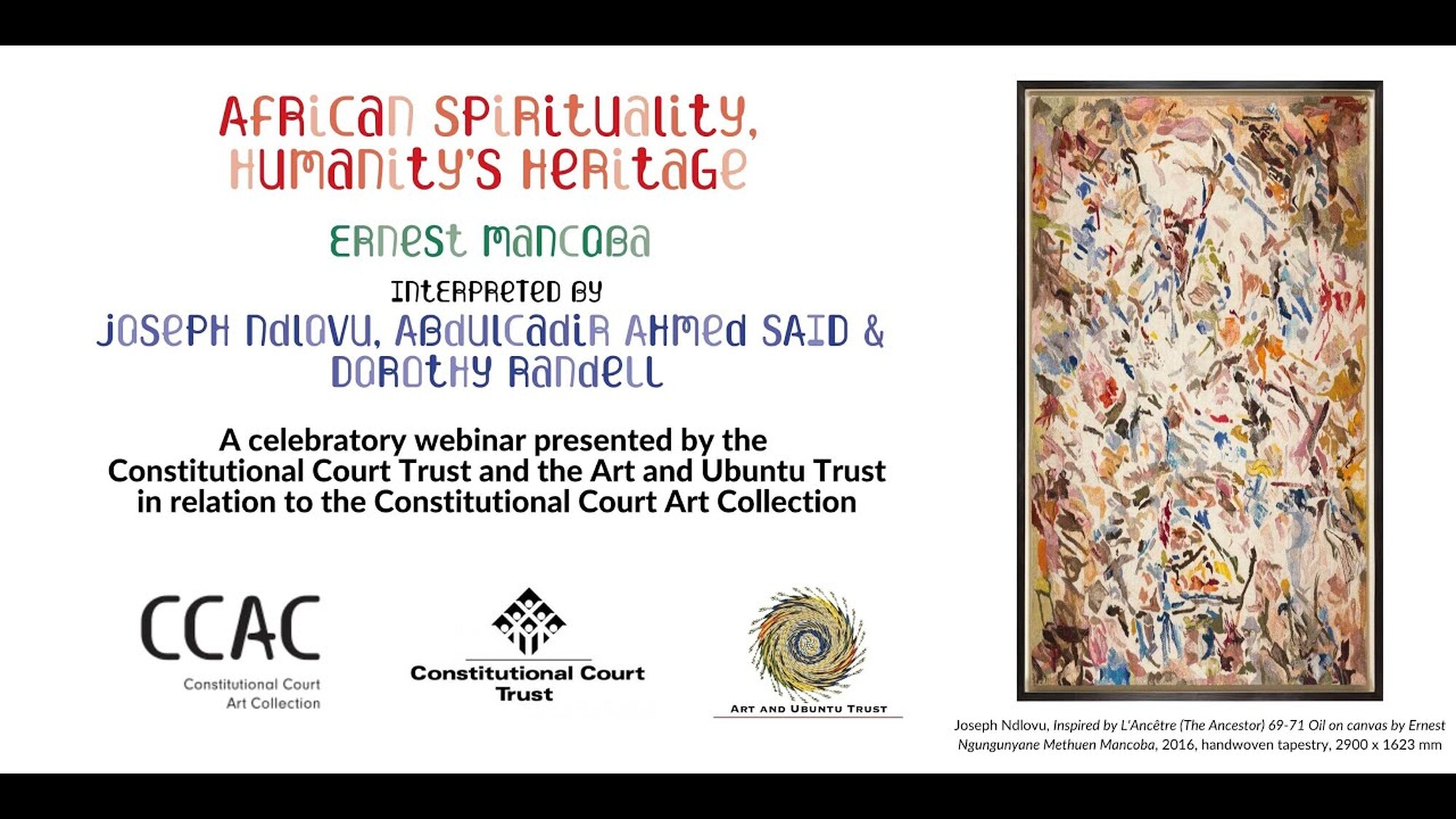Watch: ‘African spirituality, humanity’s heritage’ recorded webinar
Date posted: 10 December 2021

Vincent Baloyi and Sokhaya Charles Nkosi standing with Joseph Ndlovu's Inspired by L'Ancêtre (The Ancestor) 69-71 Oil on canvas by Ernest Ngungunyane Methuen Mancoba (2016). Baloyi, Nkosi and Ndlovu were lifelong friends.
On the 29th of November 2021, the Constitutional Court Trust (CCT), custodian of the Constitutional Court Art Collection (CCAC), and the Art & Ubuntu Trust (AUT) hosted a webinar titled African spirituality, humanity’s heritage focussed on the interpretation of the work and philosophy of artist Ernest Methuen Mancoba.
The event was also a celebration of AUT’s donation of Joseph Bhekizizwe Ndlovu's weaving (2016) of Ernest Mancoba’s oil painting L’Ancêtre and Dorothy Randell's Bust of Mancoba (1930, recast in 2016) to the CCT/CCAC in 2017. Filmmaker Abdulcadir Ahmed Said’s six minute video artwork Reading the Ancestor, donated to the CCAC by Tomas Films in 2021, was screened during the webinar as it enriches the interpretation of these works.
Prior to the webinar, Justice Sisi Khampepe, outgoing chairperson of the CCT and the CCAC Artworks Committee, said the interplay of mediums between these four distinct yet interrelated works (Mancoba's original painting, Ndlovu's textile, Randell's sculpture and Abdulcadir Ahmed's film) offer bountiful interpretive possibilities. She acknowledged the interconnectedness of South Africa with the African continent, and how the CCAC doesn't just look inwards but considers constitutionalism more broadly. The significant context of Mancoba's time spent in exile, and the sense of community across the world around what our Constitution comes to represent today was also recognised. "Mancoba’s message [...] saying we need to preserve African heritage as a shared heritage of humanity, resonates with Joseph Ndlovu's Humanity, the very first artwork of the CCAC, aptly speaking to our constitutional ideals, as reflected in the CCAC," Justice Khampepe said.
Joseph Ndlovu was commissioned to create the first artwork of the CCAC titled Humanity (1995). Years later, his interpretation of Ernest Mancoba’s oil painting L’Ancetre (1969-71), that took close to a year to complete, was the last work he completed before his death. Stacey Vorster, former CCAC curator and Artworks Committee member, spoke to Ndlovu’s work in the CCAC, as well as the bust by Dorothy Randell. Justice Albie Sachs, member emeritus of the CCAC Artworks Committee, spoke to the collection’s history and significance.
Dorothy Randell’s brief encounter with a young Ernest Mancoba during her studies at Makhanda, contributes to the materiality that enriches the depiction of Mancoba’s ancestry. Vorster highlighted the impact of these artworks as objects that bring abstract ideas into the physical world. Vorster described these acts of relooking, in both Ndlovu and Abdulcadir Ahmed’s interpretations, as moments of spiritual expression that draw out ancestral connections, offering us ways to transcend barriers and to connect with each other.
The webinar featured an array of speakers connected to the CCAC and AUT, while friends and family of the artists including Sohkaya Charles Nkosi and Vincent Baloyi (CCAC artists and close friends of Ndlovu), members of the Mancoba and Ndlovu families, and Alain Spielmann (Mancoba family friend) shared their fond memories of the late Ernest Mancoba (1904–2002) and Joseph Ndlovu (1953–2019).
The presentation of Prof Pitika Ntuli, an esteemed sculptor represented in the CCAC, related to the colonial project’s erasure of cultural heritage which is depicted in Abdulcadir Ahmed’s reading of L’Ancetre. Caribbean filmmaker Imruh Bakari described the video artwork as bearing a unique voice in African cinema through the intersectional dialogue between mediums and ancestral histories. Ziphozenkosi Dayile, a creative practitioner and curator, reflected on Mancoba’s philosophy of looking to the past to find a way to the future, reiterating the importance of Mancoba and others’ work in creating an African visuality.
Other valuable contributions were put forward by Zubeida Jaffer (AUT chair), Bridget Thompson (Executive Trustee of the AUT), and Bongiwe Hlekiso (UWC Doctoral Fellow).
A prerecorded video tour by the CCAC curatorial team showcased the works’ placement in the Constitutional Court. Inspired by L’Ancetre, the Bust of Ernest Mancoba and Reading the Ancestor are currently on exhibit in our public gallery, alongside the 30 Years in Soweto: From Resistance to Leadership print portfolio. The latter series is an act of looking back at the Soweto Uprising of 1976, in order to ascertain the road ahead by reflecting on past injustices. The portfolio features, amongst others, artists Mmakgabo Mmapula Helen Sebidi, Sohkaya Charles Nkosi and Vincent Baloyi, who in their work reflect on ancestral gifts and the resilience of the African spirit.
The full recorded webinar can be watched below:
“As the custodian of a growing collection of work, there is the reminder of the essential value of the artists, their works of art, the artefacts and materials of heritage which are an invaluable part of the pursuit of human progress and wellbeing… In dialogue with Mancoba and his paintings, [Abdulcadir Ahmed’s] artwork is a reminder that the struggle against injustice is perpetual and must be relentless.”
“In the context of the highest court in the land which upholds the law, the code of values that govern our society and which allows us to manage the most serious of matters, are human relationships. This is what art and law have in common, each codes the values of our society. One as a guide to action, the other as a guide to an expression of consciousness. It is unique and groundbreaking that a court takes art so seriously.”

Vincent Baloyi and Sokhaya Charles Nkosi standing next to their artworks that form part of the 30 Years in Soweto: From Resistance to Leadership print portfolio, donated to the CCAC by the MTN SA Foundation in 2020.

Sokhaya Charles Nkosi and Vincent Baloyi were collected from their homes in Soweto to join the webinar in celebration of their late friend. They were also interviewed by the CCAC team in the CCT offices after the webinar.
